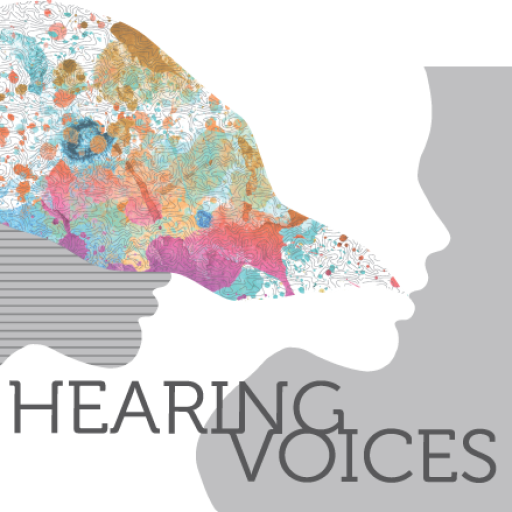This section of our exhibition was co-curated with Paul Baker, social media co-ordinator for Intervoice.
Twenty-five years after the Hearing Voices Movement first created the space for people to discuss voices, ‘the voice-hearer’ has become established as an identity people can adopt, inhabit, and mobilise in order to lay claim to a view of voice hearing as meaningful in the context of people’s lives. The challenge, perhaps, for the next quarter century is for the mental health professions fully to recognise this claim and its potentially radical implications.
‘The Voice-Hearer’, Angela Woods
The international Hearing Voices Movement (HVM) is founded on the premise that hearing voices is an understandable part of human experience that for some people causes distress and difficulty. In themselves, voices are not seen as a problem. Rather it is the difficulties some people have in coping with them, and the relationship that the person has with their voices that is the main issue. The movement also works to address the abuse, discrimination, and isolation that often contributes to the suffering that some voice-hearers can experience. The primary purpose of the movement is to create a safe space in which the meaning of voices can be explored, to raise awareness of the experience of hearing voices and to challenge negative attitudes towards and incorrect assumptions about what it means. The movement also seeks to embody the call for dignity, liberty, and self-determination for people who hear voices.
LISTEN
The podcast below contains interviews with Paul Baker, Marius Romme, Sandra Escher and Eleanor Gilbert. Produced by Andrea Rangecroft for Hearing Voices: suffering, inspiration and the everyday.
EXPLORE
Click on the buttons below to find out more about the Hearing Voices Movement and the communities and collectives that form around voice-hearing.
The Hearing Voices Movement is a call to action. It’s a call to create a world where people can talk openly about their voices, visions and other sensory experiences without fear of the consequences. Where friends, family members and colleagues react with empathic curiosity, not fear. To create a society that accepts collective responsibility for so much of the distress people face – poverty, abuse, prejudice and inequality. For each of us to refuse to look away from these injustices and commit to addressing them in our own lives. Every word and every action matters. I hope you answer the call.
Rachel Waddingham, Chair of Intervoice, October 2016
The following website and articles provide more information about the Hearing Voices Movement and the voice-hearer as a political identity.
Intervoice online – the official website of the international Hearing Voices Movement
Hearing Voices Network UK
Angela Woods, ‘Voices, identity and meaning making‘, The Lancet, 2015.



